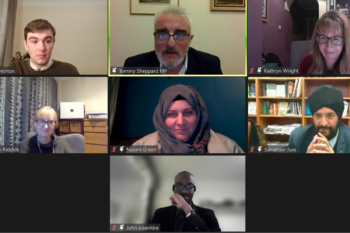
Today politicians came together with experts from across the UK to learn about recent developments in religious education (RE) and collective worship. At a joint meeting of the UK All-Party Parliamentary Humanist Group (APPHG), Accord Coalition, Northern Ireland Coalition for Inclusive Education, Humanist Society Scotland, and Wales Humanists, speakers from all four countries spoke about the implications of a recent legal judgment on RE, a new inclusive curriculum, and guidance on religious observance in schools.
Inclusive RE is important because all pupils in all types of school should have the opportunity to consider philosophical and fundamental questions, and in an open society we should learn about each other’s beliefs, including humanism. The subject of the meeting was timely because on Monday a new survey of parents found that religion and philosophical discussions are a ‘hot topic’ for the majority of families, with eight in ten discussing the origin of life and the universe with their children. Two thirds think that RE was an important part of the curriculum. The survey was run by Culham St Gabriel’s Trust. Furthermore, last week’s 2021 England and Wales Census results are proof that the UK’s outdated collective worship laws are no longer in line with modern demographics – less than 50% reported that they were Christian, and 37% stated they had no religion.
Naomi Green, from Belfast Islamic Centre and the newly formed Coalition for Inclusive Education, gave the first presentation. She summarised the divided education system in Northern Ireland, and introduced the recent High Court judgment on RE and collective worship, which found that the overwhelmingly Christian RE curriculum and compulsory collective worship breached the human rights of a non-religious father and child.
Kathy Riddick is Coordinator of Wales Humanists, and she explained to the audience the background to, and recent implementation of, a new inclusive curriculum for Wales. Crucially this Religion, Values, and Ethics (RVE) curriculum includes non-religious worldviews such as humanism on an equal footing with religions – a first for the UK. Kathy went on to say that now Wales is a minority Christian country, compulsory collective worship in schools should cease.
The third speaker was Will Norton, from Humanist Society Scotland. Will provided an overview of how Religious Observance policy is implemented in Scotland – the benefits of some of the approaches taken there, but also some of the issues that remain in the current guidance and legislation with regard to respecting children’s freedom of conscience, religion and belief.
Satvinder Juss, a barrister and also Professor of Law at King’s College London, spoke next, to provide a legal opinion on the implications of the Northern Ireland High Court case for the rest of the UK. An expert in his field, previously Satvinder has given legal commentary on the famous Fox case from 2015, which found that non-religious views such as humanism need to be given equal respect to religions in the curriculum. He said that the Northern Ireland case has similar implications for RE, and suggested that collective worship should be replaced by inclusive assemblies.
The final speech was from Dr Kathryn Wright, who is CEO of Culham St Gabriel’s Trust. Kathryn provided a summary of RE and collective worship in England, and called for a national plan for religion and worldviews education.
The All-Party Parliamentary Humanist Group is a cross-party group of Members of the House of Commons and the House of Lords, with membership from all the main parties. The Group is co-chaired by Tommy Sheppard MP, who chaired the meeting, and Baroness Joan Bakewell, and has over 115 members. Humanists UK provides the secretariat.
Notes:
For further comment or information, media should contact Humanists UK Director of Public Affairs and Policy Richy Thompson at press@humanists.uk or phone 020 7324 3072 or 020 3675 0959.
Read more about our work on religious education.
Read our article about the introduction of Religion, Values, and Ethics in Wales.
Read our article about the Northern Ireland High Court judgment.
Read our article about the debate on the Schools Bill amendment to reform RE in England.
Humanists UK is the national charity working on behalf of non-religious people. Powered by 100,000 members and supporters, we advance free thinking and promote humanism to create a tolerant society where rational thinking and kindness prevail. We provide ceremonies, pastoral care, education, and support services benefitting over a million people every year and our campaigns advance humanist thinking on ethical issues, human rights, and equal treatment for all.
